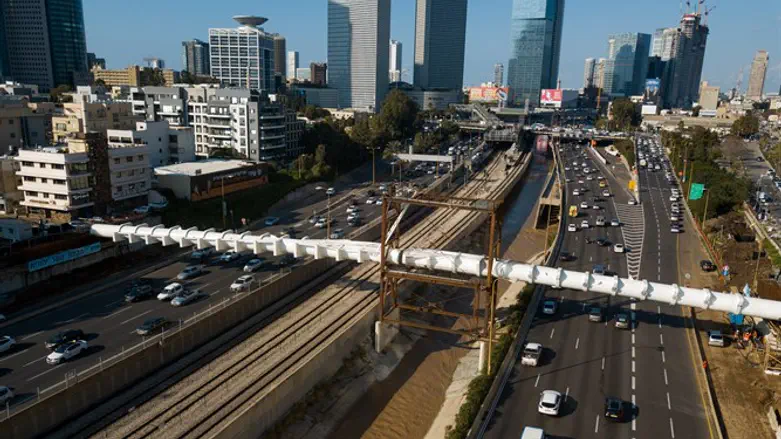
There is a saying: “There are no atheists in foxholes” which is an aphorism used to argue that in times of extreme stress or fear, such as during war ("in foxholes"), all people will believe in, or hope for, a higher power, whether or not they consider themselves atheists.
And the mere existence of the Jewish State is a miracle which by logical thinking should have been defeated in war many, many times.
If we are called upon to vote again, we should ask ourselves about the Jewish state taking halakha and those observing it into consideration as opposed to what the weekly satiric TV show Eretz Nehederet and a Haaretz columnist brought up recently: the secular two-state solution: One state for Tel Aviv and the other for the rest of Israel. The vocal mainstream media support the Tel Aviv lifestyle, gay parades in the holy city of Jerusalem and various forms of anti-halakhic behavior. This often borders on the ridiculous, even when that reporting is couched in big words written by highly educated professionals opposing traditional Judaism.
What the media is forgetting is that this “Tel Aviv” type sector is turning into a demographic minority as a result of its low birth-rate as time marches on. The majority of the population are now Mizrachim who may not dress the part and even have TV’s in their homes that they watch on Shabbat, but are firmly rooted in a Jewish lifestyle.
The tide that washed over Israel even before 1948 was an attempt to secularize the whole population in the name of modernity and it did succeed in eliminating even minimal Jewish practices among many of the generation growing up during the last century. Soviet Jewry arriving in Israel added to the wholly secular population not due to their own will, but because of the regime they came from which ensured that they lost all vestiges of religion.

Ordinary Israelis have moved right as they proudly enjoy Shabbat, festivals, understand the biblical boundaries of Israel, being kind to others and many other markers of being Jewish. Slowly but surely, since the Second World War, the haredi citizens have grown exponentially together with the national religious sector populating Judea and Shomron. Ordinary Israelis have moved right as they proudly enjoy Shabbat, festivals, understand the biblical boundaries of Israel, being kind to others and many other markers of being Jewish. True, cars fill the roads and the beaches are packed on Shabbat, but little by little, area by area, and even in some of the smaller cities, all the cars stay stationary, lining road after road as they stay parked near the curbs. Local coffee shops and restaurants remain closed as young and old do what Jews have always done for thousands of years – keep Shabbat.
Slowly but surely, since the Second World War, the haredi citizens have grown exponentially together with the national religious sector populating Judea and Shomron. Ordinary Israelis have moved right as they proudly enjoy Shabbat, festivals, understand the biblical boundaries of Israel, being kind to others and many other markers of being Jewish. True, cars fill the roads and the beaches are packed on Shabbat, but little by little, area by area, and even in some of the smaller cities, all the cars stay stationary, lining road after road as they stay parked near the curbs. Local coffee shops and restaurants remain closed as young and old do what Jews have always done for thousands of years – keep Shabbat.
Many young people are returning from their post-army jaunts overseas with a thirst for the spiritual after being exposed to authentic Judaism thanks to Chabad, something which they never experienced at home. They will think twice before voting against respect for the tenets of halakha.
We now have issues such as whether men and women should do service together in army units, whether young men should be conscripted rather than study Torah full time, whether non-essential government works should be done on Shabbat and decisions of the Supreme Court which conflict with Jewish law. We have the threat of a new election, with Avigdor Liberman of Yisrael Beytenu blaming them on the issue of whether the State of Israel should attend to halakha or not in those and similar cases.
Meanwhile, tiny steps towards a Jewish state are emerging, such as having the Hebrew date printed on drivers’ licences. The big decision of how the Knesset will run the country may not favour a halakhic mandate but it is surely going to refrain from going against it frontally. .
Should we thank our enemies for threatening us on an almost daily basis? Maybe this is a reminder of the fact that we are really at war in the volatile Middle East and should look at the whole picture.
What is missing in debates about whether Israel should give halakha a place in its governmental decisions or not is the power of prayer and the power of the Almighty to control the world. It really will not make one iota of difference what the composition of the Knesset is if a mighty earthquake hits the region or a tsunami washes over the shores of the Mediterranean.
It should never be forgotten that it is not the Knesset that runs Israel. Prayers and blessings have their part and it is the Almighty behind the scenes who runs the world, even as a larger and larger percentage of the democratic population returns to its roots.